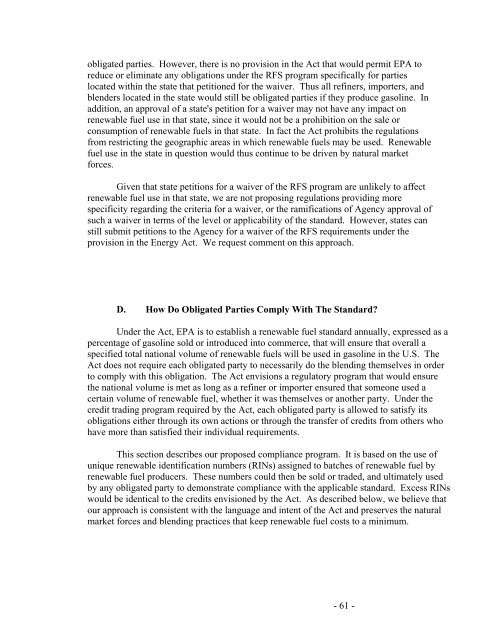Regulation of Fuels and Fuel Additives: Renewable Fuel Standard ...
Regulation of Fuels and Fuel Additives: Renewable Fuel Standard ...
Regulation of Fuels and Fuel Additives: Renewable Fuel Standard ...
Create successful ePaper yourself
Turn your PDF publications into a flip-book with our unique Google optimized e-Paper software.
obligated parties. However, there is no provision in the Act that would permit EPA to<br />
reduce or eliminate any obligations under the RFS program specifically for parties<br />
located within the state that petitioned for the waiver. Thus all refiners, importers, <strong>and</strong><br />
blenders located in the state would still be obligated parties if they produce gasoline. In<br />
addition, an approval <strong>of</strong> a state's petition for a waiver may not have any impact on<br />
renewable fuel use in that state, since it would not be a prohibition on the sale or<br />
consumption <strong>of</strong> renewable fuels in that state. In fact the Act prohibits the regulations<br />
from restricting the geographic areas in which renewable fuels may be used. <strong>Renewable</strong><br />
fuel use in the state in question would thus continue to be driven by natural market<br />
forces.<br />
Given that state petitions for a waiver <strong>of</strong> the RFS program are unlikely to affect<br />
renewable fuel use in that state, we are not proposing regulations providing more<br />
specificity regarding the criteria for a waiver, or the ramifications <strong>of</strong> Agency approval <strong>of</strong><br />
such a waiver in terms <strong>of</strong> the level or applicability <strong>of</strong> the st<strong>and</strong>ard. However, states can<br />
still submit petitions to the Agency for a waiver <strong>of</strong> the RFS requirements under the<br />
provision in the Energy Act. We request comment on this approach.<br />
D. How Do Obligated Parties Comply With The St<strong>and</strong>ard?<br />
Under the Act, EPA is to establish a renewable fuel st<strong>and</strong>ard annually, expressed as a<br />
percentage <strong>of</strong> gasoline sold or introduced into commerce, that will ensure that overall a<br />
specified total national volume <strong>of</strong> renewable fuels will be used in gasoline in the U.S. The<br />
Act does not require each obligated party to necessarily do the blending themselves in order<br />
to comply with this obligation. The Act envisions a regulatory program that would ensure<br />
the national volume is met as long as a refiner or importer ensured that someone used a<br />
certain volume <strong>of</strong> renewable fuel, whether it was themselves or another party. Under the<br />
credit trading program required by the Act, each obligated party is allowed to satisfy its<br />
obligations either through its own actions or through the transfer <strong>of</strong> credits from others who<br />
have more than satisfied their individual requirements.<br />
This section describes our proposed compliance program. It is based on the use <strong>of</strong><br />
unique renewable identification numbers (RINs) assigned to batches <strong>of</strong> renewable fuel by<br />
renewable fuel producers. These numbers could then be sold or traded, <strong>and</strong> ultimately used<br />
by any obligated party to demonstrate compliance with the applicable st<strong>and</strong>ard. Excess RINs<br />
would be identical to the credits envisioned by the Act. As described below, we believe that<br />
our approach is consistent with the language <strong>and</strong> intent <strong>of</strong> the Act <strong>and</strong> preserves the natural<br />
market forces <strong>and</strong> blending practices that keep renewable fuel costs to a minimum.<br />
- 61 -
















